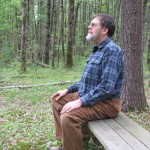I teach English.
I teach school, and I’m new enough at it that I’m still wrestling with questions of my identity as a teacher, and my idealism about teaching is barely touched with the frost of cynical experience. And I teach English, that discipline second only to Social Studies in provoking both thought and outrage with what we teach. Books, ideas, and words–learning to think, learning to feel for others (in fiction or in life), and learning to speak your truth–that is the real curriculum, when you teach English.
And I teach English.
That’s important on a whole lot of levels, including a newfound sensitivity to owning the Pagan part of my spiritual identity. Too late–even before this blog and the Quaker Pagan page went up, enough kids in my school had Googled me that I was out “of the broom closet” before my first year in the classroom had ended. Right now, though, I’m wrestling with how Quaker leadings and testimonies fit into my classroom.
My kids live in a district that is neither blindingly poor, nor dazzlingly rich. It is, however, a place of shrinking opportunity, as the blue collar jobs dry up and the economy becomes more and more polarized. A lot of my kids don’t see much reason to work very hard in school, either because they trust that their fathers’ jobs will be waiting for them when they graduate (they won’t) or because they sense that they won’t be, but can’t imagine ambitions beyond those. Others have proud family histories of military service. So, for whatever reasons, mine is one of the schools that welcomes military recruiters with enthusiasm, and plenty of our kids enlist when they leave school. Our kids show up for graduation with Marine Corps stickers on their caps, turn out for field trips to the Air Force base in huge numbers, and often have brothers, cousins, or boyfriends in the military.
I don’t know what to do about this. My job, surely, as a teacher of English, is to help kids find their own voices–not to give them my own sheet music to sing. I don’t hide my politics–kids being kids, the first thing they notice about a new teacher is the kind of car they drive, and mine is plastered with the traditional Quaker and Pagan slogans. (War is Not the Answer; Mourn the Dead, Heal the Wounded, End the War; Civi Marriage is a Civil Right; I Worship the Gods and I Vote; etc.). And there are plenty of teachable moments that life washes up on the shore of a classroom every day. I don’t have to bring political questions up for discussion–just give them a home when they do arise, and make sure that discussions stay respectful dialogs. I don’t hide my own perspective in these classroom debates, and to the extent that I have influence, I am glad.
But I also know that many of these kids have strongly held values that are very pro-military. I know that some of my most reluctant readers will pick up and become absorbed by well-written books about war (_Black Hawk Down_, _Ghost Soldiers_, _The Killer Angels_). And, as Twain said, “The man who doesn’t read good books has no advantage over the man who can’t read them.” My school does not have much of a problem with illiteracy… but it _does_ have a problem with aliteracy, and I do–strongly, passionately–feel led to work against that. I stock the books that kids read, whether I like their themes or not.
But it plays hell with my peace testimony, I can tell you.
I am thinking of one student in particular this morning. Sixteen years old, but not planning, with so many of her peers, to go to the prom this weekend, because _her_ boyfriend is getting ready to ship out with the military. There are others–the boy who told me last year that he was going to enter the army because he knew he couldn’t find anything better, the environmental, GLBT-activist girl whose famly history with Vietnam has convinced her that military service is noble and good… I hate knowing that my students are now at such risk. They seem so young to me–was I really that young when I was in high school?–but they can be killed or damaged by this war all the same. Iraq is much nearer than it looks on an atlas, and the tiny openings it seems like I have to share my peace testimony feel so useless and so small in the light of current events that it just makes me sadder.
Should I be actively preaching at my kids? It feels feeble to be standing on the sidelines, coaching kids to love to read and to write with clarity and conviction when, in so few years, they may be dying–or killing. But without the tools of thought, how are they going to keep themselves out of the military? Lack of alternatives is such a powerful recruitment tool for the military. And those who contemplate enlisting for idealistic reasons are at least living their ideals–this is such a cynical time to be an adolescent. If nothing else, scolding strikes me as an unlikely tool for changing a teenager’s mind…
I try to plant seeds. I try always to do so from a place of real respect for my students and their families. I hope I don’t try too hard, and lean over backwards, and wind up implying an endorsement of what I hate. I think I have done that, sometimes. And the stakes are high. But I think about my husband’s teenaged ideas about joining the Marines, and how his seriously considering it did not keep him from arriving at his peace testimony in the end… maybe even helped him get there. And I think about George Fox’s saying to William Penn, when he asked if, now that he was a Friend, he really had to stop wearing his gentleman’s sword: “Wear it as long as thou canst.” There is a value to allowing people to find their own way to Truth.
But I also think about my brother, and the pain that is in him over his time in the Navy. And I think of a Friend in my meeting, who shines with the light of his peace work… but who has also shared some of his indelible grief for the time that he turned weapons against other people. Maybe anything is justified in order to prevent this kind of suffering–let alone the broken lives in Iraq? Maybe there should be room for polemic in the classroom?
This feels like thought to me, though, not leading. And the big insight I had when I got slammed with my conversion to the peace testimony back in 2001 was that my brain, my pesky, tricksy, over-active human brain, was never going to be clever enough to solve the whole nightmarish issue of war, and I ought to just keep it simple, trust the spirit that was leading me, and let go. Let myself be, as the message came to me, “a single leaf on a single tree in a great forest” of people who are trying to be faithful. I don’t have to understand it–I just have to trust it.
Right. Back to the root. Maybe tomorrow I’ll be called to chain myself to the fence outside the White House. Today I teach English. And I don’t proselytize. I’m plant seeds and try to make the unthinkable–refusing to wage war–thinkable, by being a visible alternative. This may not be enough–in fact, I’m bloody sure it’s _not_ enough–but I think it’s what I’ve got as _my_ leading, today.
I think. But, I’ll tell you, I am really churned up, knowing that my kids are being blighted by this war.















